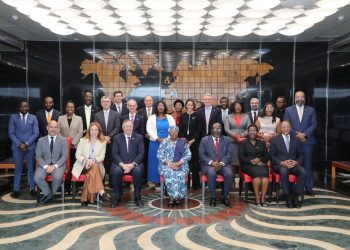
The Namibia Fishrot scandal shook the nation to its core, exposing pervasive corruption within the country’s fishing industry and revealing deep-seated governance failures.
This scandal, which led to the incarceration of high-ranking officials and prominent businessmen, underscored the urgent need for systemic reform and integrity rebuilding within Namibia’s governance structures. However, despite the glaring lessons learned from Fishrot, little has been done to strengthen governance systems. Moreover, beyond the corruption and theft, the scandal also shed light on the catastrophic mismanagement of vital fish resources, impacting the economy.
As Namibia attempts to rebuild transparency and accountability, valuable lessons must be gleaned from the Fishrot corruption scandal and applied across other sectors, notably the oil and gas industries. Amid significant discoveries of oil in the oil and gas sector, Namibia stands at a critical juncture where the adoption of Extractive Industries Transparency Initiative (EITI) principles is imperative.
Understanding EITI
The Extractive Industries Transparency Initiative (EITI) stands as a beacon of hope in the fight against corruption and mismanagement within resource-rich nations. As Namibia grapples with the aftermath of the Fishrot scandal, the imperative to domesticate EITI principles into legislation becomes paramount. EITI embodies a global standard for the governance of extractive industries, emphasising transparency and accountability throughout the resource extraction process. It mandates the disclosure of critical information, ranging from license allocation to revenue utilisation, fostering collaboration within governments, among companies, and civil society to enhance governance practices.
Role of Legislation in Domesticating EITI
In the wake of Fishrot, legislative action emerges as a powerful tool to institutionalise transparency and accountability within Namibia’s extractive sectors. Parliament, as the representative voice of the people, assumes a pivotal role in crafting and enacting laws that codify EITI principles into the national legal framework. This attempt not only aims to rectify past wrongs but also serves as a crucial lesson learned from the depths of corruption exposed by the scandal. Additionally, a legal regime advocating for local content.
Crafting Comprehensive Laws: Legislation must go beyond superficial reforms, addressing systemic issues highlighted by the Fishrot scandal. Parliament’s mandate involves drafting laws that mandate transparency in license allocation, revenue reporting, and contractual agreements within the oil and gas sector. These laws should be comprehensive, covering aspects such as beneficial ownership disclosure, fiscal arrangements, and environmental protection measures. Laws that does not only obliges companies to disclose and report their revenue, but also obliged the state to disclose the money it received from those companies.
Ensuring Accountability: The mismanagement of fish resources in the Fishrot scandal underscored the need for stringent accountability mechanisms. Legislation must hold both public officials and private entities accountable for their actions, imposing penalties for corruption, bribery, and non-compliance with the law. By enacting laws that mandate strict enforcement and prosecution of lawbreakers and corrupt activities, Parliament upholds the rule of law and safeguards public trust. The rule of law which is a foundational principle of our Constitution and the principle of accountability inherent in our constitutional values would require the State to prosecute those who transgress these legislations without bias in order to serve the public, which is better served by the State addressing the scourge of corruption within the operation of the rule of law.
Limiting Discretionary Powers: The Fishrot scandal exemplifies the dangers of granting excessive(wide) and unchecked discretionary powers granted to government officials, in resources and licence allocation. Legislators must learn from past mistakes by imposing checks and balances on administrative bodies involved in resource allocation. The must give effect to the constitutional values that calls for limitation, clear and checked powers of public functionaries, as it is well known that failure to so lead to corruption and misuse of powers.
Promoting Stakeholder Engagement: Legislation should encourage proactive participation from civil society and extractive companies in EITI processes. Parliament can mandate the establishment of Multi-Stakeholder Working Groups, ensuring inclusive governance and fostering dialogue among diverse stakeholders. By enshrining provisions for stakeholder engagement in EITI legislation, Parliament strengthens accountability mechanisms and promotes transparency across the extractive industries. This legislation must go beyond actively promoting and safeguarding whistle-blowers.
Enforcing Compliance: Laws without enforcement mechanisms remain toothless. The Government agencies (GA) tasked with this role must play a proactive role in implementing and enforcing EITI legislation. GA charged with oversight should be adequately resourced and empowered to monitor compliance, conduct audits, and investigate allegations of wrongdoing. The executive branch through policy formulation and enforcement, hold both public and private actors accountable to the law.
As Namibia stands at the cliff of significant developments in its oil and gas sector, the lessons learned from the Fishrot scandal serve as a stark reminder of the perils of unchecked corruption and mismanagement. By legislating for transparency and accountability, Parliament not only addresses past grievances but also paves the way for a more sustainable and equitable future.
Through comprehensive laws that domesticate EITI principles, Namibia can emerge as a beacon of good governance in the realm of extractive industries, safeguarding its resources for generations to come, while at the same time promoting and attracting investors in the sector.
*Juan Simson Kauluma is an LLM Candidate in the Law of Mineral and Petroleum







